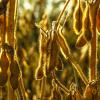
Options Winter 2020: A recent IIASA study highlighted the importance of considering the impacts of changes in temperature and precipitation in the development of Brazilian agribusiness.
In 2017, agriculture contributed to 23.5% of Brazil’s GDP and 40% of its exports. With so much hinging on agriculture in the country, scientists from IIASA and Brazil’s National Institute for Space Research (INPE) set out to measure the impacts of climate change on Brazilian agriculture. Their task was to understand such impacts on staples like soybeans, corn, and sugar cane. In much of Brazil, production of these crops will not be economically sustainable, the team concluded.
According to the Global Biosphere Management Model (GLOBIOM-Brazil) soybean production in the Cerrado decreases at least 20% compared to a scenario without climate change. In one area, considered the next frontier of Brazilian soybean production, it could be as large as 60% in 2050.
These results highlight the importance of considering the impacts of changes in temperature and precipitation when planning for the development of Brazilian agribusiness. It also stresses the necessity of a robust national agricultural policy, including investments in modern technology and management methods to mitigate such changes.
“The future of Brazilian agriculture depends on growing productivity quickly enough to avoid (or to adapt to) the most nefarious impacts of climate change,” says IIASA guest researcher, Aline Soterroni.
“Our study also shows that the areas in the Amazon and the Cerrado biomes that are being deforested now are likely to be less suitable for agriculture in the future, pointing to the need for policy enforcement to preserve those ecosystems.”
By Michael Fitzpatrick
